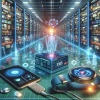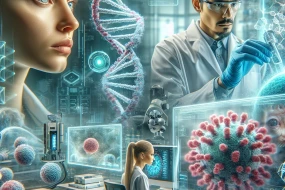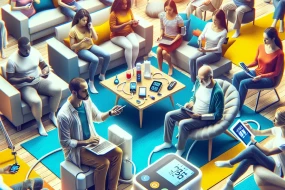
As technology continues to evolve at a breakneck pace, the way we monitor our health is transforming right alongside it. The future of health monitoring is not just about wearable devices and smart gadgets; it's about integrating technology into our daily lives in ways we never imagined. In this article, we'll explore how the tech industry is reshaping health monitoring, what innovations are on the horizon, and how these advancements could change the way we care for ourselves and each other.
The Rise of Wearable Technology
Wearable technology has become a staple in the health monitoring landscape, with devices like smartwatches and fitness trackers leading the charge. These gadgets have evolved from simple step counters to sophisticated health monitors that track heart rate, sleep patterns, and even blood oxygen levels. But the future holds even more promise. Imagine a world where your wearable device can detect potential health issues before they become serious problems. Companies are investing heavily in research and development to create sensors that can monitor glucose levels or even detect early signs of diseases like Alzheimer's. However, it's crucial to remember that these devices are only as good as the data they collect. Ensuring accuracy and reliability remains a significant challenge.
AI and Machine Learning: The New Frontiers
Artificial intelligence (AI) and machine learning are revolutionizing health monitoring by analyzing vast amounts of data to provide personalized health insights. These technologies can identify patterns and trends that are invisible to the human eye, offering recommendations tailored to individual needs. For instance, AI algorithms can predict the likelihood of a heart attack based on historical health data, enabling preventive measures. Yet, with great power comes great responsibility. Developers must ensure that AI applications are free from biases and inaccuracies that could lead to harmful outcomes.
Remote Health Monitoring: A New Normal
The COVID-19 pandemic accelerated the adoption of remote health monitoring, highlighting its potential to transform healthcare delivery. Telemedicine platforms and remote monitoring devices have made it possible for patients to receive care from the comfort of their homes. This shift not only improves access to healthcare but also reduces the burden on healthcare facilities. However, the success of remote monitoring hinges on robust data security measures to protect patient privacy and prevent unauthorized access to sensitive information.
The Internet of Medical Things (IoMT)
The Internet of Medical Things (IoMT) refers to the network of connected devices and sensors that collect, analyze, and transmit health data. This interconnected ecosystem has the potential to revolutionize patient care by providing real-time health insights. For example, smart inhalers can track medication usage and alert patients to potential triggers for asthma attacks. However, the integration of IoMT devices into healthcare systems poses challenges, such as interoperability issues and the need for standardized protocols.
The Role of Big Data in Health Monitoring
Big data analytics is playing an increasingly important role in health monitoring by enabling healthcare providers to make data-driven decisions. By analyzing large datasets, healthcare professionals can identify trends and correlations that inform treatment strategies and improve patient outcomes. For instance, big data can help track the spread of infectious diseases and predict outbreaks. Nevertheless, the collection and analysis of personal health data raise ethical concerns about privacy and consent.
Common Mistakes to Avoid in Health Monitoring Technology
1) Over-reliance on Technology: While technology can provide valuable insights, it's essential to consult healthcare professionals for accurate diagnoses.
2) Ignoring Data Privacy: Failing to protect patient data can lead to breaches and loss of trust.
3) Misinterpretation of Data: Without proper understanding, users may misinterpret health data, leading to unnecessary anxiety or complacency.
4) Lack of Regular Updates: Technology evolves rapidly, and failing to update devices or software can compromise their effectiveness.
5) Skipping Professional Guidance: It's important to use health monitoring tools as a supplement to professional medical advice, not a replacement.
The Future is Here: What's Next?
The future of health monitoring promises exciting advancements that will make healthcare more accessible, personalized, and efficient. From smart tattoos that monitor vital signs to ingestible sensors that provide real-time feedback on medication adherence, the possibilities are endless. As we look to the future, it's crucial to balance innovation with ethical considerations, ensuring that technology serves as a tool for empowerment and not a source of division. By embracing these advancements responsibly, we can pave the way for a healthier and more connected world.































